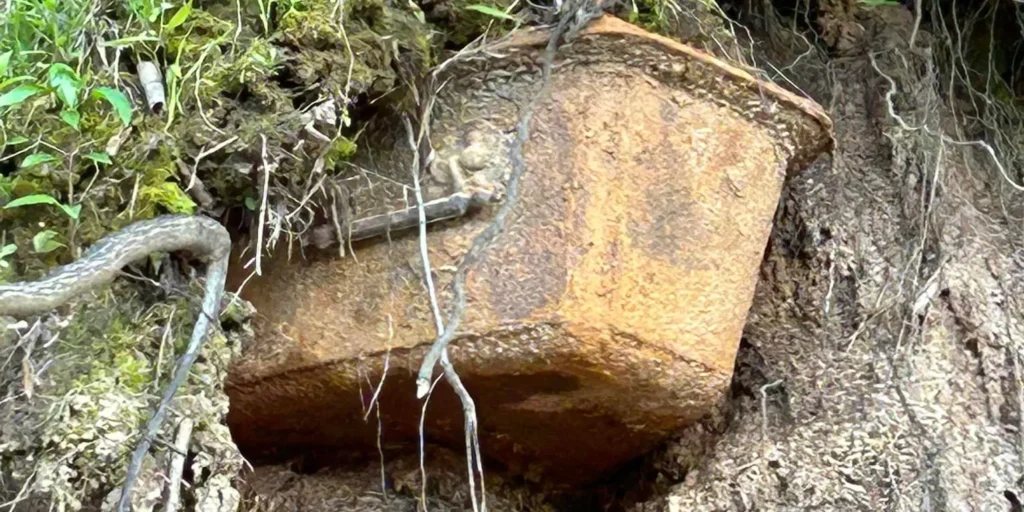Newsmatro

Climate change is not only disrupting the lives of the living but is also having a profound impact on the rest of us – the dead.
Rising temperatures, more extreme weather events, and the resultant natural disasters are threatening burial grounds across the world. Cemeteries have traditionally been serene and comforting final resting places, but they are increasingly exposed to environmental hazards, including floods, erosion, wildfires, and other climate-related challenges.
In Brighton, Alabama, Sherene Johnson’s family faces the recurrent issue of rain-induced flooding in the predominantly African American Brighton Memorial Gardens, where ten of her family members are buried. The pain and distress caused by this situation have been described as “traumatizing” by Johnson, who serves as a city councilwoman.
Sadly, such heart-wrenching experiences are becoming more common for families nationwide as climate-driven forces dislodge vaults and caskets from their intended resting places. Historically, cemeteries have been vulnerable to neglect, disrepair, and occasional flooding, but experts are increasingly reporting a worsening trend due to the amplified impact of climate change.
Leslee Keys, a historic preservation consultant in St. Augustine, Florida, emphasized that “wild storms and sea level rise are threatening more so than in the past.”
Over the past three decades, reports of flooding, erosion, and other climate-related weather disasters affecting cemeteries have emerged in at least 21 states and 15 countries, disturbing thousands of graves and even leading to the exposure of remains. State and local governments, as well as the Federal Emergency Management Agency (FEMA) and cemetery associations, have started allocating millions of dollars for cemetery preservation efforts. Relocating or reburying remains can cost anywhere from $8,000 to $10,000 per grave site, according to estimates by experts.
One particularly striking example of climate-induced cemetery disturbances was witnessed in Copiah County, Mississippi, where Judy Blair Berry and her husband spotted a casket protruding from the riverbank, along with pieces of gravestones scattered on the shore. The nearby Catchings Cemetery has faced ongoing troubles, partly due to extreme fluctuations in water levels caused by a dam and reservoir upstream.
Climate change isn’t confined to a specific region; it affects burial sites from coast to coast. Rising temperatures, for instance, thaw permafrost in Alaska, leading to sinking graves among various other issues. Conversely, states like Florida experience increasingly heavy rainfall, intensifying flooding concerns in cemeteries.
In Louisiana, the effects of climate change have been particularly pronounced, with at least eleven hurricanes wreaking havoc in the state since 2002. This has led to the disturbance of thousands of graves and the washing away of hundreds of vaults and caskets. A combination of subsiding land and rising sea levels exacerbates the issue, resulting in the loss of numerous cemeteries in southern Louisiana parishes.
Notably, cultural and historic cemeteries, especially those of African American and Indigenous communities, are at heightened risk due to their often secluded or low-lying locations on private land. While they hold significant cultural value, these cemeteries face greater challenges in terms of preservation.
David Anderson, a professor at the University of Tennessee, emphasized the immense scale of the problem, stating that it affects people worldwide. Graves have been affected in several countries in recent years, including Nigeria, Thailand, and the United Kingdom.
Addressing the challenges faced by cemeteries will require the support of the public and policymakers, along with innovative solutions beyond traditional approaches. Measures such as building seawalls, stabilizing shorelines, and relocating graves have been considered to safeguard cemeteries. However, these solutions can be complex and expensive, with archaeological costs alone estimated at around $3,000 per grave.
The impact of climate change on cemeteries is a pressing issue that communities and governments must address to ensure that the deceased can rest in peace without disruptions caused by climate-related disasters.